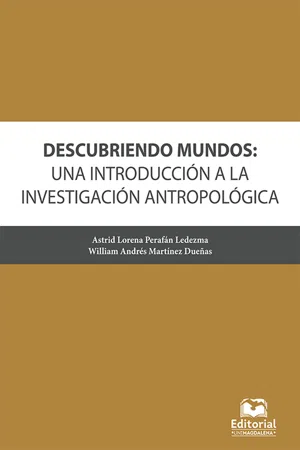
eBook - PDF
Descubriendo mundos: una introducción a la investigación antropológica
- English
- PDF
- Available on iOS & Android
eBook - PDF
Descubriendo mundos: una introducción a la investigación antropológica
About this book
Esta obra ha sido concebida a manera de guía para orientar los primeros ejercicios de investigación en antropología, abordando aspectos como: a) la problematización y la planificación de la investigación (proyección)
Frequently asked questions
Yes, you can cancel anytime from the Subscription tab in your account settings on the Perlego website. Your subscription will stay active until the end of your current billing period. Learn how to cancel your subscription.
No, books cannot be downloaded as external files, such as PDFs, for use outside of Perlego. However, you can download books within the Perlego app for offline reading on mobile or tablet. Learn more here.
Perlego offers two plans: Essential and Complete
- Essential is ideal for learners and professionals who enjoy exploring a wide range of subjects. Access the Essential Library with 800,000+ trusted titles and best-sellers across business, personal growth, and the humanities. Includes unlimited reading time and Standard Read Aloud voice.
- Complete: Perfect for advanced learners and researchers needing full, unrestricted access. Unlock 1.4M+ books across hundreds of subjects, including academic and specialized titles. The Complete Plan also includes advanced features like Premium Read Aloud and Research Assistant.
We are an online textbook subscription service, where you can get access to an entire online library for less than the price of a single book per month. With over 1 million books across 1000+ topics, we’ve got you covered! Learn more here.
Look out for the read-aloud symbol on your next book to see if you can listen to it. The read-aloud tool reads text aloud for you, highlighting the text as it is being read. You can pause it, speed it up and slow it down. Learn more here.
Yes! You can use the Perlego app on both iOS or Android devices to read anytime, anywhere — even offline. Perfect for commutes or when you’re on the go.
Please note we cannot support devices running on iOS 13 and Android 7 or earlier. Learn more about using the app.
Please note we cannot support devices running on iOS 13 and Android 7 or earlier. Learn more about using the app.
Yes, you can access Descubriendo mundos: una introducción a la investigación antropológica by William Andrés, Martínez Dueñas in PDF and/or ePUB format, as well as other popular books in Social Sciences & Anthropology. We have over one million books available in our catalogue for you to explore.
Information
Table of contents
- 1. DESCUBRIENDO MUNDOS: UNA INTRODUCCIÓN A LA INVESTIGACIÓN ANTROPOLÓGICA
- 1.8. Referencias citadas
- 1.7. Referencias sugeridas
- 1.6. Qué son los datos
- 1.4. Qué es método
- 1.3. Qué es teoría
- 1.2. Investigación en antropología
- 1.1. Qué es la investigación
- 1.5. Qué es técnica
- 2. P PASOS PARA DAR INICIO A LA INVESTIGACIÓN DOCUMENTAL Y CONSOLIDAR UN TEMA O IDEA DE INVESTIGACIÓN
- 2.10. Referencias citadas
- 2.9. Taller llevando a la práctica la investigación documental: Revisión bibliográfica de conceptos
- 2.8. Ejemplos para realizar la revisión documental y conceptual
- 2.7. Pasos para realizar la búsqueda bibliográfica
- 2.6. Ejemplos de construcción de temáticas de investigación
- 2.5. Estrategia de investigación documental
- 2.4. Pautas para iniciar la investigación documental
- 2.3. Relevancia de los recursos documentales
- 2.2. Recursos documentales
- 3. ANTECEDENTES DE INVESTIGACIÓN
- 3.5. Referencias citadas
- 3.4. Taller revisión y organización de trabajos antropológicos realizados en Colombia sobre el tema de investigación elegido
- 3.3. Toma de notas y elaboración de fichas o reseñas de lectura
- 3.2. Ejemplos sobre cómo construir los antecedentes
- 3.1. Recomendaciones para la construcción de los antecedentes
- 4. PROBLEMÁTICA DE INVESTIGACIÓN Y OBJETIVOS
- 4.6. Referencias citadas
- 4.5. Taller construcción de problemática de investigación y justificación social y académica.
- 4.4. Ejemplos sobre cómo construir la problemática de investigación.
- 4.3. Justificación y pertinencia de la investigación
- 4.2. Objetivos
- 4.1. Etapas de la problematización
- 5. MARCO TEÓRICO
- 5.4. Referencias citadas
- 5.3. Taller construcción del marco teórico y conceptual
- 5.2. Ejemplos de marco teórico y conceptual
- 5.1. Estrategias para construir el marco teórico
- 6. LOS MÉTODOS DE INVESTIGACIÓN EN ANTROPOLOGÍA
- 6.8. Referencias citadas
- 6.7. Taller construcción de la metodología
- 6.6. Ejemplos sobre metodología de investigación
- 6.5. Algunos elementos para tener en cuenta en la construcción del método de investigación
- 6.4. Técnicas de recolección de información cuantitativa
- 6.3. Técnicas de recolección de información cualitativa
- 6.2. Etnografía
- 6.1. Los métodos
- 7. RESULTADOS DE INVESTIGACIÓN
- 7.3. Referencias citadas
- 7.2. Taller resultados de investigación
- 7.1. Ejemplos sobre cómo presentar resultados de investigación
- 8. DISCUSIÓN Y CONCLUSIONES
- 8.5. Referencias citadas
- 8.4. Taller construcción discusión y conclusiones
- 8.3. Ejemplos discusión y conclusiones
- 8.2. Conclusiones
- 9. INFORME FINAL
- 9.2. Taller informe final de investigación
- 9.1. Cómo elaborar un informe final de investigación
- 10. CÓMO CITAR LAS REFERENCIAS CONSULTADAS
- 10.4. Referencias citadas
- 10.3. Cómo elaborar las referencias bibliográficas
- 10.2. Cómo citar fuentes bibliográficas al interior del texto
- 11. NORMAS GENERALES PARA PRESENTACIÓN DE TRABAJOS
- Referencias generales citadas
- 11.3. Referencias citadas
- 11.2 Tablas, cuadros o gráficos